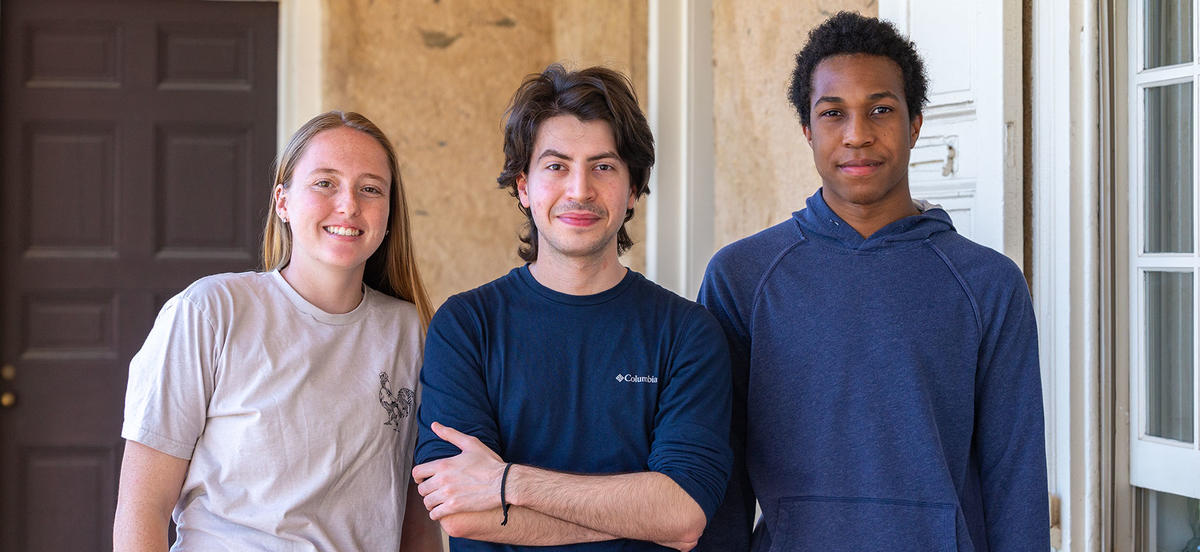Haverford Team Triumphs at Philly Codefest Competition

Trinity Kleckner '24, Ahmed Haj Ahmed '26, and Kai Britt '26. Photo by Patrick Montero.
Details
The team came up with a web app designed to help refugees integrate into their new communities and build new lives for themselves and their families and won the award for Best Diversity, Equity and Inclusion Hack, one of 10 awards issued at the Comcast-sponsored event held at Drexel over the March 11-12 weekend.
It was one hour into the 10th Annual Philly Codefest, and a slight panic was hovering over the Haverford College team.
Trinity Kleckner ’24, Kai Britt ’26, and Ahmed Haj Ahmed ’26 needed an idea for the software and hardware hackathon competition at Drexel University, and they needed it fast. And, says Kleckner, the team’s junior captain and student-coach, they were determined to “make sure that it actually means something, and it’s not just some fun shopping app or something.”
Inspired by Ahmed’s harrowing experience as a Syrian refugee, their approach delivered on that commitment. The team came up with a web app designed to help refugees integrate into their new communities and build new lives for themselves and their families. “Lighthouse,” as they called it, won the award for Best Diversity, Equity and Inclusion Hack, one of 10 awards issued at the Comcast-sponsored event held at Drexel over the March 11-12 weekend.
“It's fantastic that Haverford students are participating in hackathons at other schools,” says Shayna Nickel, associate program director of the Haverford Innovation Program, which the three students are involved in. “These types of events are demanding but useful. In a compressed time frame, students must apply and stretch their development knowledge and skills creatively while collaborating on a shared project vision.”
This year’s event drew 46 teams from universities and the public sector. Its theme was “AI Everywhere” and sought to generate “real-world, scalable software and hardware solutions to improve and expand artificial intelligence’s positive societal impacts.”
Coding began on Saturday morning, and projects had to be submitted by noon the following day. Because Drexel closed its buildings at night, the Haverford team had to scurry back and forth between campuses. They worked until 3 a.m. Sunday, slept for a few hours, and were back at it by 7 a.m.
That was hardly an issue for any of them, most notably Ahmed, a 21-year-old freshman. Ahmed and his family have been forced to relocate several times since they fled their rebel-occupied home in Northwestern Syria 12 years ago, attempting to assimilate into a new and unfamiliar culture at each stop. Housing, employment, healthcare, education, legal aid, and other resources were hard or even impossible to obtain due to unfamiliar languages, governments, customs, and people.
“I wish when I first moved to Turkey that there was something like an app or website or anything that helps facilitate this process of transitioning into a new place,” says Ahmed.
The team’s web app, which uses OpenAI's GPT3, provides a user-friendly interface—with no complicated features—to connect refugees with resources that offer services such as housing, employment, healthcare, education, legal aid, and more.
There are still some kinks to implementing Lighthouse, says Kleckner. The team needs more time, a commodity none of them will have until the summer, they say. Funding is an issue too, not just for this project, but for future competitions and endeavors. Many of the bigger schools have faculty coaches. Haverford’s group is student-run. “We are looking at getting back into it and seeing if Haverford is interested in funding a little bit more work on it,” she says. “We'd like to do more research and get some professional opinions before we put it out there because it is a vulnerable population, and we don't want to do anything that could [cause] harm.’’ While the GPT responses are specific enough to really provide value to the user, the app protects the privacy of its users, shielding what is often sensitive information for refugees entering the U.S. There are no accounts created by the app, adding to the challenge of assuring it was user friendly.
“Our goal was to create a web app that required as little digital literacy as possible,” Kleckner says. “So once you navigated to the website, everything was just really clear.”
That simplicity is critical, says Ahmed, for those with limited English. When he arrived in Turkey just three years ago, he could not speak English, he says. He taught himself, then volunteered to teach English and math in a refugee camp near where his family still resides.
“For some time, I had to work to support my family,” says Ahmed. “During that time, I was also applying to scholarships and colleges abroad. One year ago I was accepted to Haverford, and they gave me an amazing scholarship.
“It’s the reason I am here today. We went to Codefest just to build something and have fun. The reason I love computer science is because I feel like it empowers me to make change in people's lives. And that’s what could happen here.’’
—Sam Donnellon



